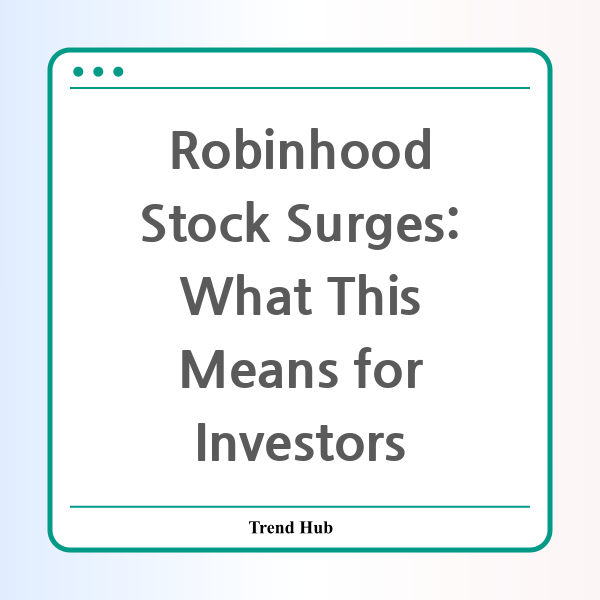* This website participates in the Amazon Affiliate Program and earns from qualifying purchases.

Are you keeping an eye on Robinhood? The trading platform has recently captured the spotlight as its stock takes a significant leap following a series of favorable analyst comments and a regulatory settlement. Let’s dive into what this means for investors and how it could impact Robinhood’s trajectory moving forward.
Robinhood's stock saw a remarkable increase, climbing sharply after the company announced a $45 million settlement with the U.S. Securities and Exchange Commission (SEC). This settlement addresses allegations spanning back to 2018 concerning multiple regulatory violations. Investors responded positively, viewing this as a pivotal moment after a series of challenges that had plagued the company over recent years.
To put things into perspective, analysts from Morgan Stanley have placed Robinhood on their "Financials’ Finest" list of top financial stocks to own. This kind of recognition is not just a nod to the company’s recovery but also suggests a robust confidence in Robinhood's potential to grow within the financial sector. Meanwhile, Bernstein Research analysts have named Robinhood a “best idea,” emphasizing its potential upswing aligned with the anticipated expansion of its crypto trading operations.
The performance of Robinhood's shares over the past year has been nothing short of impressive, boasting an astonishing return of 259%. As of now, the stock is trading at approximately $42.10 with a market capitalization of $37.1 billion. Bernstein analysts are optimistic, maintaining an Outperform rating and a bullish price target of $51 for the stock by 2025. This outlook is grounded in an expected revenue growth rate of 36%, alongside improvements in profitability.
One of the critical factors influencing Robinhood's stock surge is its development in the cryptocurrency sector. With the company taking a cautiously conservative approach to its crypto offerings—currently listing around 20 tokens—analysts believe its potential for expansion in this rapidly growing market could be substantial, especially if future regulatory environments become more favorable.
Moreover, the regulatory settlement with the SEC signifies a resolution to past issues that had overshadowed the company's operations. Bernstein’s analysts view this settlement as a catalyst for growth, positing that a more pro-crypto stance from the SEC under a potential shift in administration could pave the way for Robinhood to enlarge its share in the crypto trading market.
Despite its strong recent performance, Robinhood's average account size still lags behind competitors, which raises questions about its long-term profitability. However, with a strong emphasis on innovation and product diversification, Robinhood is making strides to attract more active users. This diversification, coupled with positive trading volumes and revenue growth—reportedly 35.7% over the last twelve months—creates a robust foundation for future success.
Several financial institutions, including JPMorgan, Piper Sandler, and Goldman Sachs, have upgraded their ratings on Robinhood, reflecting an increasing belief in its recovery and growth prospects. The consensus recommendation leans toward a ‘Buy’ rating, with analyst target estimates ranging from $29 to $60.
In summary, the recent surge in Robinhood's stock, alongside positive analyst sentiments and regulatory developments, paints an optimistic picture for investors considering entering or maintaining positions in the company. As Robinhood navigates the complexities of the trading environment, particularly in cryptocurrency, its approach and performance will be crucial to watch in the coming years.
* This website participates in the Amazon Affiliate Program and earns from qualifying purchases.